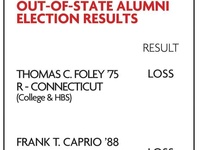Goddard says that his priority in addressing the issue of immigration would be to urge the federal government to pass an immigration reform bill. “Because of the federal government’s failure to act either in securing the border or in forcing employer sanctions...we may have to again go it alone and try to find a solution for our state,” he warns.
Though each state presents its own challenges to its would-be political leaders, there are some problems that are troublesome nationwide. All of the candidates interviewed for this story mentioned their states’ economies and budget deficits among their foremost concerns.
“By far the most important issue is our economy and the fact that it’s in such bad shape,” says Goddard. “After years of spectacular success, we’re on the rocks. We have the largest job loss in the country on a per capita basis, and that’s a real reversal of fortune for the state of Arizona.”
In Connecticut, Republican candidate Thomas C. Foley ’75 says, “To create jobs in Connecticut, it will require the government to get the budget under control, because no employers are going to come here. Too many people don’t see the opportunities here that they used to...we need to change the policies that have run businesses out of the state.”
Focusing on families as well as businesses, Foley, whose son is currently a sophomore at the College, added, “We simply tax people too much in Connecticut.... Families are struggling all over Connecticut, and state government isn’t reducing spending.”
THE HARVARD EFFECT
Many of the candidates reflect on elements of their Harvard backgrounds that influence their political involvement to this day.
Mapp says choosing to spend two years studying government and business at Harvard was “the singular most important decision I made that is benefiting my community.”
He adds that his education among classmates from a variety of countries “allowed me to put the problems confronting the people of the Virgin Islands in great perspective and realize [that] with some of the petty politics in our community, we were squandering great opportunities.”
Heidepriem also praises the political education he received at the Kennedy School. “I would say that the Kennedy School was an important laboratory of ideas for me. It was helpful in allowing me to think about policy questions and in crystallizing my own point of view,” he says. “I wouldn’t say that my opinions changed at all, but the way in which I approached public policy questions moved from an emotional basis to an empirical, rational structure.”
Berkowitz recalls discussing politics with his roommates in Quincy House. “Unfortunately for them, they are now some of my biggest contributors,” he jests, adding that his former roommates now send donations to his campaign, even though none of them live in Alaska,
Berkowitz’s undergraduate years also helped lead him to Alaska, the state where he has lived for the past 20 years and that he hopes to helm as governor. Raised in California, he wrote his thesis on “the political economy of Antarctica” and became enamored by the “high latitude attitude” that he found there while performing his thesis research.
“When you live in a place where you can rise or fall based on your own personal ability, that’s very attractive,” he says. “When you have fewer people, there are more opportunities for that.”
Foley noted that three current gubernatorial candidates—Margaret “Meg” C. Whitman of California, Governor John H. Lynch of New Hampshire, and himself—were all members of the Class of 1979 at Harvard Business School. Lynch later served as the Business School’s director of admissions.
“We’re seeing a trend of people going into elected office who are not career politicians and have qualifications other than just having succeeded in getting elected to office,” Foley observed. “I think that’s a very good trend for the country.”
Read more in News
University Asks for 5-Year Plans













